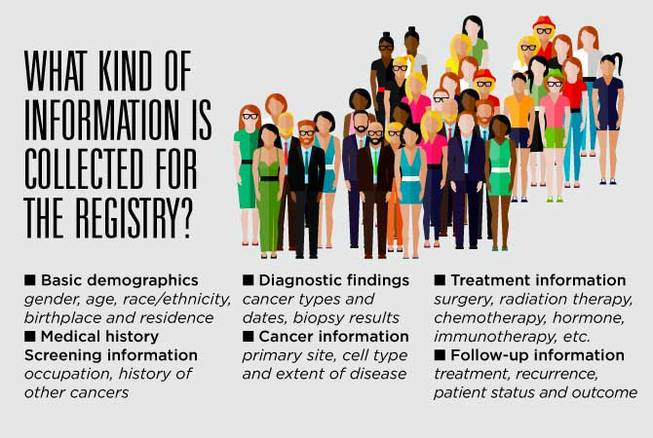
Saturday, April 11, 2015 | 2 a.m.
The National Cancer Registry is the benchmark database for cancer information in the country.
It is used by hospitals to improve treatment methods, by researchers to help guide and shape reporting, and by the government to help build programs and allocate funding. The registry is powered by a network of Certified Tumor Registrars (CTRs), who record the information of every cancer patient in the country.
“They create a storyline for every patient with cancer, and then that information is standardized and streamlined into the database,” said Dr. Brian D. Lawenda, MD, of Sunrise Hospital and Medical Center and clinical director of radiation oncology at 21st Century Oncology. “Cancer registrars are extremely diligent and hardworking people.”
How the registry works
Most major hospitals have a dedicated CTR on staff who records information about every patient with cancer. For smaller institutions, the state helps collect and manage the information.
History of a cancer patient
CTRs trace the tumor lineage of the patient by collecting and summarizing relevant information. All of the information collected is confidential and HIPAA compliant.
Collecting medical history and follow-up information can prove challenging. “It’s very difficult to trace all the cancer patients’ stories from start to finish,” Lawenda said. “CTRs might send certified letters or reach out to other medical institutions.”
What kind of information is collected?
• Basic demographics — gender, age, race/ethnicity, birthplace and residence
• Medical history
• Screening information — occupation, history of other cancers
• Diagnostic findings — cancer types and dates, biopsy results
• Cancer information — primary site, cell type and extent of disease
• Treatment information — surgery, radiation therapy, chemotherapy, hormone, immunotherapy, etc.
• Follow-up information — treatment, recurrence, patient status and outcome
Why is the registry important?
When dealing with a complicated and deadly disease such as cancer, diligent and organized data curation can mean the difference between life and death for thousands of people every year.
“The information we get through the cancer registry is very useful, and its usefulness extends across many different, far-reaching platforms,” Dr. Brian D. Lawenda said. The National Cancer Registry has paved the way for cancer research, legislation, funding, prevention and quality treatment for patients.
At the local level
Once information is compiled, it is put into the hospital’s cancer registry. The hospital maintains its own registry to track screening, treatment and outcome statistics for its patients. This allows doctors and administrators to evaluate their progress compared with other hospitals, the state standard and the national standard.
The Commission on Cancer also helps evaluate that data for its accredited hospitals and checks the quality of data being added to the registry by those hospitals. From that information, doctors and administrators will set up quality improvement programs if need be. Sunrise is one of five accredited cancer programs through the Commission on Cancer in Nevada.
How it is used: If one hospital’s colon cancer outcome rates, based on cancer stage, are less successful than the outcome rates of other hospitals in the region, for example, the hospital will identify the reason why and take steps to ensure its treatment is up to standard.
At the state level
From the hospital’s registry, information becomes part of the state registry. The state uses the information to track incidence and outcome trends, and decide if it needs to intervene.
How it is used: If the mortality rate of, say, skin cancer in women ages 40 to 55 were to double in a year, the state might decide to allocate resources toward raising awareness about skin cancer screening and orient it specifically toward middle-aged women.
At the national level
From the state registry, information becomes part of the national registry, used to drive research, programming and funding.

Join the Discussion:
Check this out for a full explanation of our conversion to the LiveFyre commenting system and instructions on how to sign up for an account.
Full comments policy